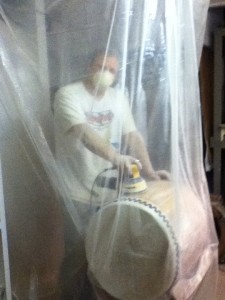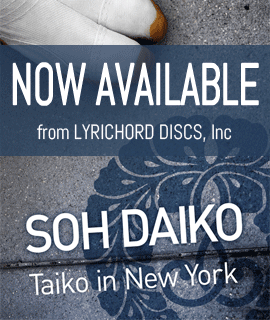To many taiko players, taiko drums are more than just our “equipment”. Taiko playing is an art form, and the drums and various instruments are instruments and works of art themselves. They are to be treated with respect and reverence. We consider it a great privilege to play taiko.
Taking care of taiko drums and various other instruments takes many forms. Every practice we take great care when packing and unpacking the drums, being careful not to place them with the head directly on the floor unless there is a blanket, mat, or stand underneath. We take great care in handling our bachi, not placing them on the head of the drums, not leaving them lying around, and not throwing them carelessly to the side. The list can go on, but today we’re going to focus on some heavier maintenance.
As you may know, we practice taiko in New York City at the New York Buddhist Church. It is located in a residential area, so we can’t drum as often as we wish. For those days where we can’t drum, we fasten custom-made pads to the drum heads with bungee cords. The pads are made of various layers: tape, rubber, foam, wood, and a few other things I cannot readily identify. They must be able to take a regular and steady beating, so these are bonded to each other with caulk.
We use the drums for many performances throughout the year as well as twice a week for practices, so they take a great beating. The drums themselves splinter from playing the kara-ka-kas of various pieces, so these are fixed with a sander and with epoxy.
In addition, we:
- cleaned out our closets where we store our instruments and equipment
- sanded bachi
- shined chappa
- varnished stands
- verbed nouns
- cleaned fues
- jingled bells
- shook shekere
- sewed costumes
- and much more!
So don’t forget take regular care of your various taiko instruments and equipment so they will last longer, look better, and sound richer! Remember, a healthy taiko is a happy taiko!








